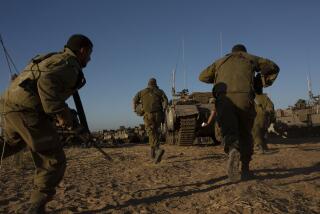After Dust Settles, Hard Part Comes
- Share via
The world has been bracing for America’s war against Saddam Hussein to begin. But in reality, it already has.
Our war planners have always embraced Sun Tzu’s counsel that the battle for the mind precedes the battle for the terrain. That’s why American and British operatives have been inside Iraq for weeks -- collecting intelligence, bribing tribal chieftains, communicating the futility of resistance to Iraqi commanders. Iraq’s military computers have been penetrated so that reconnaissance, targeting and fire-control systems will go haywire when the fighting starts; the e-mail inboxes of Hussein’s generals have been filled with messages to persuade them that an early surrender is preferable.
What will begin when the guns start to fire is a new, visible and devastating stage of a campaign that is already underway. This new and overt phase will prove brief because Hussein stands on shaky political and military ground. Fear is the foundation of his regime, and it has served the tyrant well. But once it’s clear that Hussein’s days are numbered, most Iraqis will rejoice. The Iraqi leader’s bluster about armed citizens waging partisan war is a fantasy.
The battle for Baghdad will be difficult, but it won’t be the quagmire some pundits predict. Hussein’s armed forces are a third smaller than they were in 1991. Their arsenal is shopworn thanks to U.N. sanctions: Spare parts are scarce; readiness and effectiveness have crumbled. Hussein will concentrate his troops near population centers, hoping U.S. strikes kill civilians and roil the Arab “street.” But all will be to no avail. Lacking cover, Hussein’s armored divisions will be sitting ducks; bereft of close air support, they will be unable to counterattack in force.
The U.S. victory will be quick and decisive. Our problems will begin once Hussein’s fortress of fear has been razed. The euphoria of Iraqis who greet U.S. soldiers as liberators will dissipate after the dust settles and they resume life’s routines. Their leader gone, Iraqis will look to the U.S. for daily necessities: food, clean water, medicine and transportation. Millions of refugees will need food and shelter.
Manichean theories casting the U.S. as either impotent or omnipotent are ubiquitous in the Middle East. Once Americans display their awesomeness as warriors, they will be expected to show similar prowess as providers. Running a large, fractious, shattered nation of 26 million is herculean in the best of times. These are not such times.
Reconstructing a shattered Iraq will require tens of billions of dollars. Iraqis -- particularly children -- have suffered dreadfully because of U.N. sanctions and Hussein’s heartlessness. They will have high expectations of the U.S. cash cow. How, amid soaring budget deficits and a slowing economy, will we meet them? Having waged war without the support of key allies, we should not think that many of them will write checks to lighten our burden.
Bush administration officials once mocked Clintonite “nation-building.” Ironically, they may prove their point. Iraqis’ bitterness over the gap between what they desire and what we can deliver will mount. Once hailed as liberators, Americans could soon be seen as occupiers.
The war won’t merely increase our expenses; it could also decrease our security. Hussein is hardly the quintessence of Islamic piety, but in death he may be reinvented as a martyr.
Three qualities define America: democracy, capitalism and universalism. When it comes to terrorism, these qualities are also vulnerabilities, for they entail openness to people, ideas and commodities from the world beyond.
The American way of life offers terrorists innumerable easy targets: at home, tall buildings, sports stadiums, transportation networks and shopping malls; abroad, embassies, tourists, corporations, businesspeople, missionaries and exchange students. These “soft” targets cannot be made secure at a remotely feasible cost. If a war presented as essential to slay the dragon of terrorism makes it fiercer, our lives will be at greater risk, our liberties and our prosperity will diminish and the tolerance we have for one another -- a shining example of diversity’s compatibility with harmony -- will fray. Terrorism can never conquer us, but it could transform us. “If you look into the abyss,” Nietzsche warned, “the abyss will look into you.”
President Bush insists that the war is essential to make America safe in a world remade by Sept. 11. That is the standard that Americans will ultimately use in judging the war. They will applaud the ease of victory. Their verdict on whether it has made them safer may prove different.
More to Read
Sign up for Essential California
The most important California stories and recommendations in your inbox every morning.
You may occasionally receive promotional content from the Los Angeles Times.










